Stories
December 21, 2023
The story of Kiruba Munusamy, human rights lawyer and Dalit women activist from India
Originally published on March 6, 2019 as written by Patrick van Wersch
Edited by Olivia Ayes
Kiruba was happy to accept the police training institute’s invitation to speak about human rights violations in India. After her talk she met fifty of the institute’s young students. They had seen some of her Facebook posts and expressed their admiration for her work. “We don’t know how you do it, but we feel inspired,” they told her. She replied: “Never constrict your dreams.”
Not long ago, she heard a story about a woman who trains girls from tribal communities in India on how to get an education and find employment. The woman had an opportunity to travel to the U.S. and deliver a TED Talk about her work. The woman worried that her English was not good enough to speak to an American audience. But then she watched a video of Kiruba’s Hague Talks speech and realised that the message matters more than how well one speaks the language.
Indeed, 32-year-old Kiruba Munusamy is a master at delivering a message. She must be, otherwise she would have never made it to the Supreme Court of India where she works as an independent human rights lawyer.
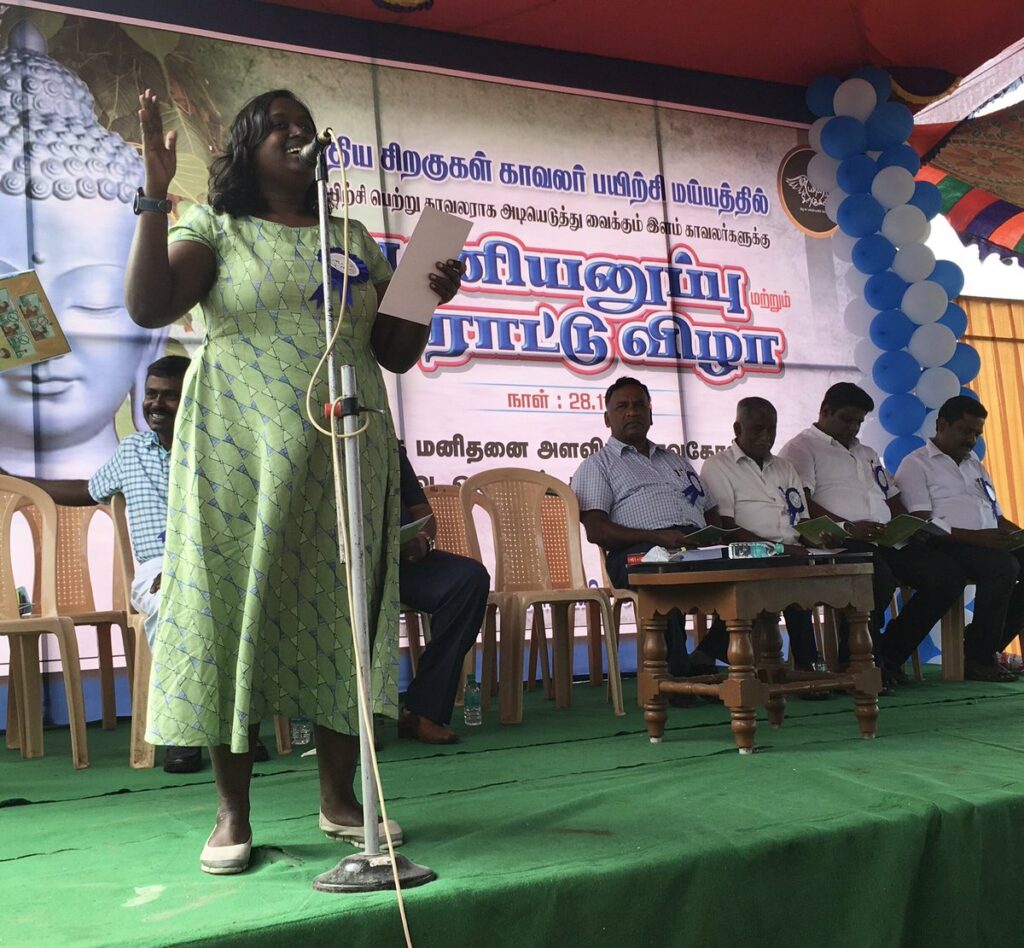
Caste atrocity cases
In a recent case, Kiruba represented a husband whose pregnant wife was murdered soon after they got married. The wife’s family allegedly poisoned her because the husband belonged to a lower caste. He therefore requested the court to treat the case as an honour killing. He was eventually unsuccessful, and the husband now wants to bring it before the Supreme Court. Time and time again, Kiruba has seen courts refuse to consider atrocity cases as caste based, instead treating them as ‘regular’ criminal cases under the Indian Penal Code.
An LGBTIQ organisation asked Kiruba to help a gay couple that had fled from India to the U.K. eight years ago after their families attempted to kill them. Now these relatives supposedly sent gunmen to target the two men. Making matters worse, the men’s asylum requests have been rejected by the U.K. government. In an attempt to overturn this decision, the organisation asked Kiruba to write a letter describing the human rights situation in India, in particular for those who are part of the LGBTIQ community. She wrote the letter but is sceptical it will make much difference.
“India is on the ‘safe country list’,” Kiruba points out. “And the Indian Supreme Court has recently given verdicts that are perceived as favourable to homosexuals and transgender people. But just as strict anti-discrimination laws don’t eradicate racial discrimination in countries like the U.S. and the U.K., likewise, in India, these verdicts don’t protect LGBTIQ. Besides, a Supreme Court that routinely passes judgements declaring clear caste atrocity cases as fake doesn’t sound very progressive to me.” (For more on this read the paragraphs under the heading “Legal and social justice.”)
Hinduisation is hurting India
Kiruba is adamant that India, the world’s biggest democracy, is not the modern and tolerant country many believe it to be. She finds the most persistent misconception to be that Hindu culture can be equated with Indian culture.
The famed Bollywood industry is an—at first glance—innocent case in point. Contrary to popular belief, the Hindi-language, Mumbai-based film industry, is not India’s national cinema. Bollywood’s focus on Hindu customs paints a one-sided and inaccurate picture of the on-the-ground-reality for most Indians.
Undeniably less innocent is that “India is being ruled by a Hindu fundamentalist party that is trying to overturn our history,” as Kiruba succinctly puts it. “The ruling Bharatiya Janata Party (BJP) does everything it can to stigmatise Muslims and Dalits (the lowest social group in the Hindu caste system)—for eating beef, for instance, even though there is nothing in our constitution or laws that prohibits that. They just want everyone to fit into the Hindu framework.”
The Hinduisation of India is hurting marginalised communities and minorities. In early January, India’s lower house of parliament approved a bill that would grant citizenship only to non-Muslim immigrants—a position observers say constitutes an attack on India’s secular character. Still, the international community, by and large, holds that India is a progressive nation. Old stereotypes about India as a spiritual and ‘Gandhi-style’ peace loving nation, continue to fool the outside world into thinking that it can’t be all that bad. On several occasions, Kiruba has shocked international audiences with stories about how the Hindu caste system continues to divide the country as it permeates through all layers of society, all branches of government, and the entire judicial system—an arena that she, as the first Dalit woman lawyer from her state of Tamil Nadu to practice law in the Supreme Court, is very familiar with.
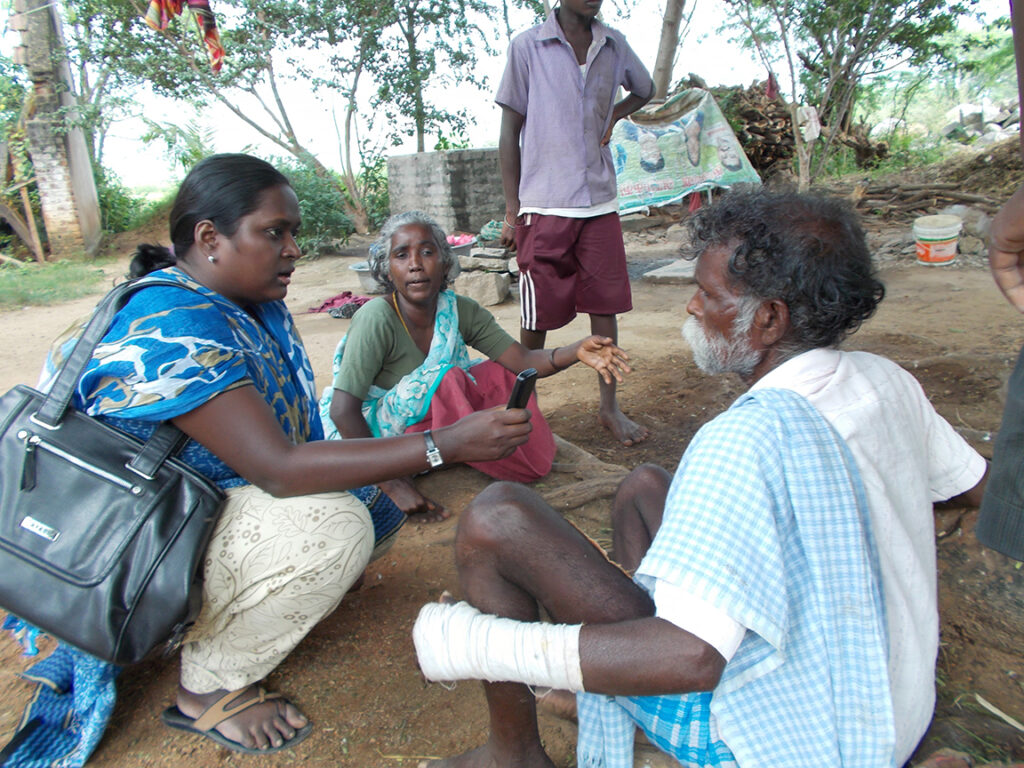
From law firm to independent counsel
Kiruba is not the only Dalit lawyer in the Supreme Court, but she is the only one who openly identifies as one, and she uses that platform to advocate for the rights of the Dalit people. It’s no surprise that in the beginning she felt like the odd one out.
After passing the bar in 2008 at age 22, she quickly made a name for herself by taking on sensitive cases that involved Dalit women who were raped and rights of transgender people. It was clear from the beginning of her career that Kiruba did things her way. Before going at it alone as an independent counsel in the Supreme Court, she tried working at a couple of law firms. The first firm she joined didn’t tolerate her appearance: hair down, pants, shirt, and dark skin. Because the firm’s senior counsel refused to take her to the courtroom, she quit ten days after she started. The second office she joined didn’t allow her to eat non-vegetarian food, not even in the Supreme Court canteen. The office’s senior counsel also discouraged her from pursuing a career in law because of her gender, telling her to go home and ask her mother to find a suitable husband. She quit the firm after a month.
“The irony was that the senior lawyers of both firms had daughters who studied law,” Kiruba recalls. “I was not able to survive in this environment of nepotism. I decided to work independently. Now, most of my clients can’t even pay the court fee and the filing expenses, let alone my professional fee. But their needs are great, so I often work pro bono, and try to crowdfund the money we need.”
The barriers to justice are not only financial, however. People from marginalised communities are not represented in the courts because there are only few lawyers—and even fewer judges—that share Kiruba’s background. She therefore started a training centre for human rights litigation where lawyers, including women from disadvantaged communities, can be trained with professional skills and provided with a co-working space to act independently. The centre will also provide paralegal trainings to activists working for the Dalits, minorities, and LGBTIQ community. These trainings focus on the technicalities of pleading in the lower courts, also known as trial courts, where cases are heard the first time. So far, she has conducted three free workshops. Kiruba aims to improve the standard of lawyering, and, in the process, further diversify the community of legal practitioners. She also hopes that with her as a contact, her trainee lawyers will feel more confident to encourage clients to appeal cases to the Supreme Court.
Legal and social justice
In her almost decade-long career as a lawyer and activist, Kiruba has come to the conclusion that ridding the country’s legal system of biases built up over many decades is a prerequisite for achieving social justice. One of those biases is the issue of equal representation, which she is trying to tackle with the training centre, and by encouraging students from marginalised communities to pursue law degrees. At the same time, the south Indian lawyer sees a clear imbalance between constitutional law and social law. “The constitution says that equality prevails,” Kiruba notes. “Social laws say that inequality and the caste system prevail. The way courts deal with caste atrocities is a good example that something’s off here. That’s why we need to change the social laws. Because when social justice is not guaranteed, we pave the way for a hierarchical Hindu society based on inequality.”
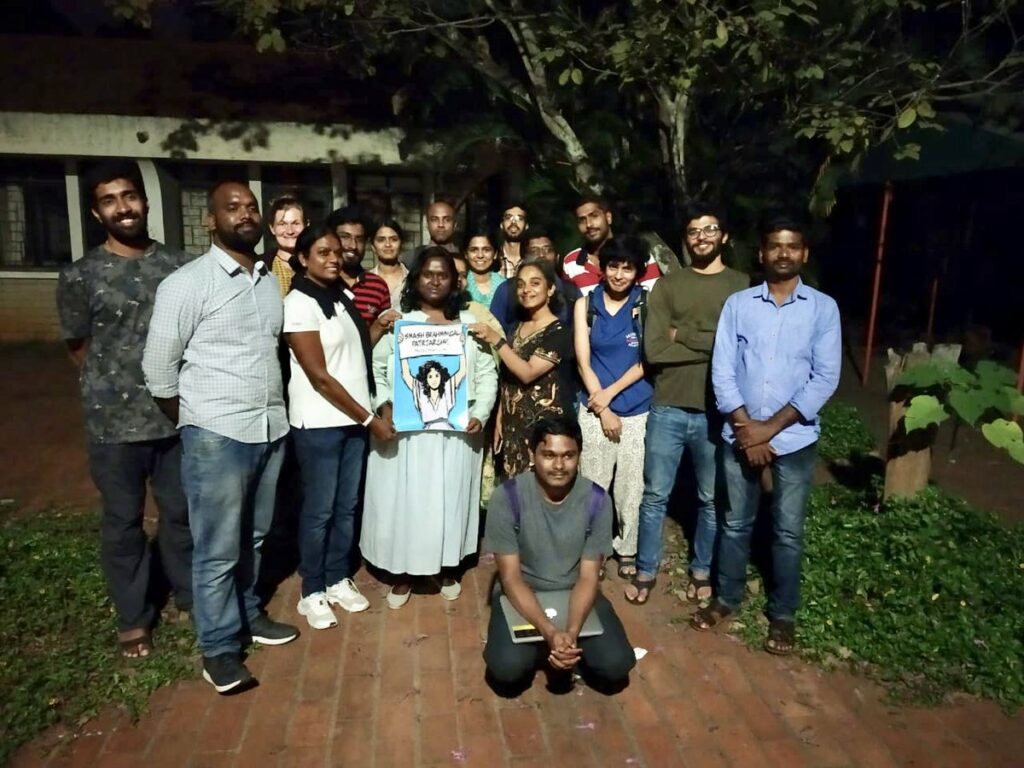
Speaking about equal representation, Kiruba mentions that there are only three women and no Dalit or Muslim judges in the Supreme Court. She’s perplexed how judges can rule on caste atrocities and discrimination of women when the vast majority are men and all of them exclusively come from privileged backgrounds.
“The ruling BJP does everything it can to stigmatise Muslims and Dalits […]—for eating beef, for instance, even though there is nothing in our constitution or laws that prohibits that. They just want everyone to fit into the Hindu framework.”
Kiruba can recite countless of caste-related criminal cases where the culprits, due to prevalent caste bias, were acquitted because the burden of proof was unfairly put on the lower caste victims and witnesses. In the late sixties, for instance, the High Court of Madras acquitted all twenty three defendants, all rich landowners, who were suspected of burning to death five men, sixteen women, and twenty three infants. The court held that the prosecution’s claim that these rich men would have “walked to the scene, and set fire to the houses, unaided by any of their servants,” as too unlikely to be true.
In 1991, the High Court of Andhra Pradesh ruled to acquit the defendants suspected of killing eight people. In this case, “the witnesses, who were not able to furnish the names of their companions, were made to spell out not only the names of hundreds of accused, but also of their fathers.” Obviously, the witnesses weren’t able to do so.
Lastly, in 1996, nineteen women and one child were murdered, after which the defendants allegedly set fire to the village. The High Court of Patna held that the prosecution witnesses were unreliable because they were neighbours of the accused, and the accused would not expose “their identity in broad daylight giving people opportunity to identify them.” Also, the court held that the prosecution’s claim that the defendants had come to eliminate everyone in the village was unfounded, stating: “People who were intent to liquidate everybody, naturally would have seen that there are no male members, [and] they would have searched for male members who were all hiding in close proximity to the village itself. This is unnatural for the prosecution witnesses.”
According to a report from the National Crime Records Bureau, from 2011 to 2016 the average conviction rate in a total of 106,100 completed trial cases involving crimes against scheduled castes in India, was only twenty seven percent.
Growing up ‘Dalit’ in a higher caste community
Kiruba is no stranger to the fact that laws do not always translate into social justice. She grew up with two older sisters in a Dalit community in the city of Salem in the south Indian state of Tamil Nadu. She describes it as a place that didn’t offer much in terms of inspiration. It was a slum where youngsters often got arrested and where girls would marry young, sometimes as early as sixteen or seventeen, and have their first baby not long after. It was a place where richer neighbourhoods dumped their garbage, and where sewage pipes ended.
Kiruba’s parents wanted a better life for their daughters so they moved to another neighbourhood to live among families of a higher caste. Kiruba learned how to tell lies to hide her ancestry, and her family gave up beef eating. For half a year none of the other residents suspected a thing. Then, somehow, word got out they were Dalit. Neighbours stopped talking to them. When it was time to collect water from the public tap, Kiruba was refused a spot in the queue. One time, another girl left her pot under the tap, and Kiruba moved it to stop it from overflowing. When the girl returned she poured out her pot and cleaned it thoroughly, because Kiruba had touched it. This must be what it feels like to be considered a Dalit, Kiruba thought. This is how higher castes perceive us: as unclean, as untouchables.
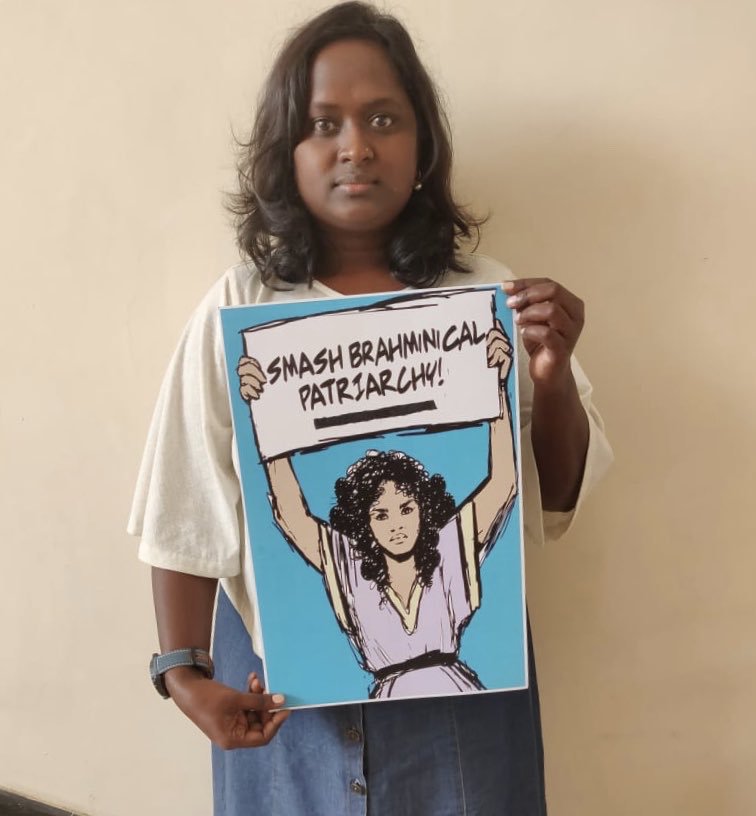
But nothing could deter her father from making sure all of his children received a good education. For Kiruba he had a law degree in mind, and she did indeed find herself drawn to this discipline. The cost of their education put enormous pressure on the family, but they somehow made it work. Looking back, Kiruba says that compared to other Dalit children she had a relatively comfortable life as most Dalit kids are expected to work to support their family. What she did have to deal with, however, especially as a Dalit woman, was the prejudice and discrimination still rampant in Indian society today.
Fighting for women’s rights from the womb
Historically, Dalit women have been considered to be available for the sexual desire of the dominant caste. As they worked subservient jobs they were—and still are—sexually abused, exploited, and looked down on out of a twisted sense of societal superiority. Kiruba thinks this is why her mother was distraught when she didn’t have any boys—a frustration she took out on her youngest daughter which caused their relationship to deteriorate.
“I was the third unwanted girl child of my mother, and she supposedly had plans to abort me,” says Kiruba in a surprisingly casual tone. “In a way, you could say that I’ve been fighting for women’s rights since I was still in the womb. Growing up, my mother was made to feel inferior to her brothers. She wanted a male child so that she could dictate the family through her son, and exercise power over her daughter-in-law. Even today you’ll hear people say that with a son you don’t have to worry about your future. After all, daughters become the ‘property’ of their husband’s family, but sons, they stay.”
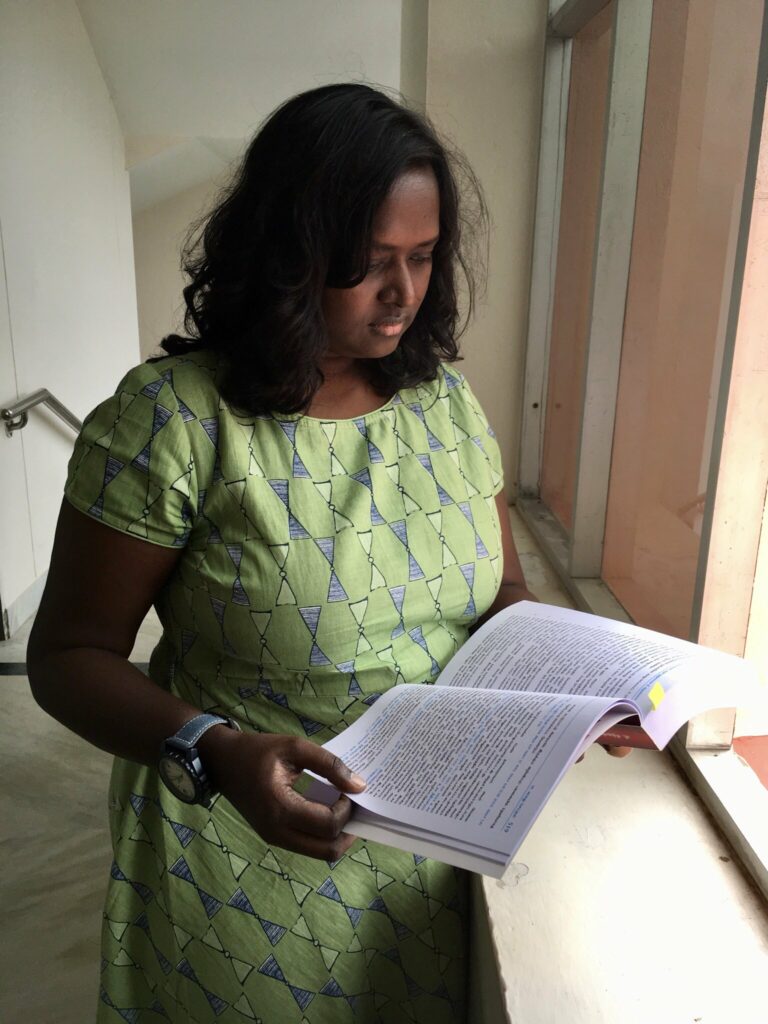
As the youngster was finding the academic fulfillment her father so strongly desired, and later when she moved to Chennai and Delhi to practice law, Kiruba was confronted with some of the same obstacles her mother had faced. One of them involved her love life—or lack thereof.
The deadly reality of inter-caste marriages
“When you’re a Dalit woman living in a city, like me, you basically don’t get to date anyone,” Kiruba remarks candidly (read this insightful blog about Dalit women and modern day dating in India written from the perspective of a Christian Dalit woman). “Inter-caste marriages are glorified in India, especially among Dalit men who believe it’s an honour to marry up. For Dalit women arranged marriages are the only way to find a husband. As I’m not keen on that, my options are limited.”
They may be popular among Dalit men, but in India, inter-caste marriages can have deadly consequences. According to Kiruba, the Hindu nationalists oppose inter-caste relationships and marriages in order to protect caste purity. Describing them as “Indian caste-based supremacists,” she says they see inter-caste marriage as a serious threat to their ideology.
The constitution says that equality prevails […]. Social laws say that inequality and the caste system prevail. The way courts deal with honour killing is a good example that something’s off here. That’s why we need to change the social laws. Because when social justice is not guaranteed, we pave the way for a hierarchical Hindu society based on inequality.
Violent attacks on inter-caste couples, especially by their family members, are quite prevalent in Indian society. The family members of the high-caste boy or girl often end up carrying out honour killings. They kill either their own children or their low-caste lovers. Kiruba has dealt with many cases of honour killings, and on numerous occasions she’s given legal help to inter-caste couples.
As a lawyer, she can even convene inter-caste marriages—to the grave dislike of some. One such time, she suffered not only a rhetorical blowout, but a devastating physical one, too. To prevent this marriage from occurring, she was intimidated at her house and over the phone. One day, as she was returning from court, unidentified ruffians stabbed her on the left side of her body. Bafflingly, the police investigators assigned to her case were more interested in getting the name of the fiance, a Dalit boy, rather than going after the dominant caste girl’s family. The police officers questioned Kiruba’s mother about it when her daughter was still unconscious.
Having lost a lot of blood, Kiruba says her condition was “very serious.” She still has a long vertical scar from her chest to her abdomen from the operation the doctor performed to verify that none of her internal organs had been damaged. When she came through, her mother pressured her for days to give up the name of the boy. She even wanted her to give up human rights work altogether, and start a “normal family life,” as she called it. “Because I didn’t oblige, my family temporarily excommunicated me,” says Kiruba. “For a few years, I only spoke to one of my elder sisters.”
Don’t stop speaking out
Since the attack, Kiruba has continued to speak and write about the issues she cares about: caste and gender based discrimination, discrimination in academic spaces, state repression, death penalty, Dalit women’s empowerment, indigenous rights, LGBTIQ rights, the advancement of disadvantaged groups, and the freedom of expression. She’s frequently asked by news media to reflect on Supreme Court rulings, or hot button issues such as the #MeToo movement. Her social media accounts are other platforms she uses to share her views. Appallingly so, in response to her advocacy, Kiruba routinely receives insults, and even rape and death threats—both online and offline.
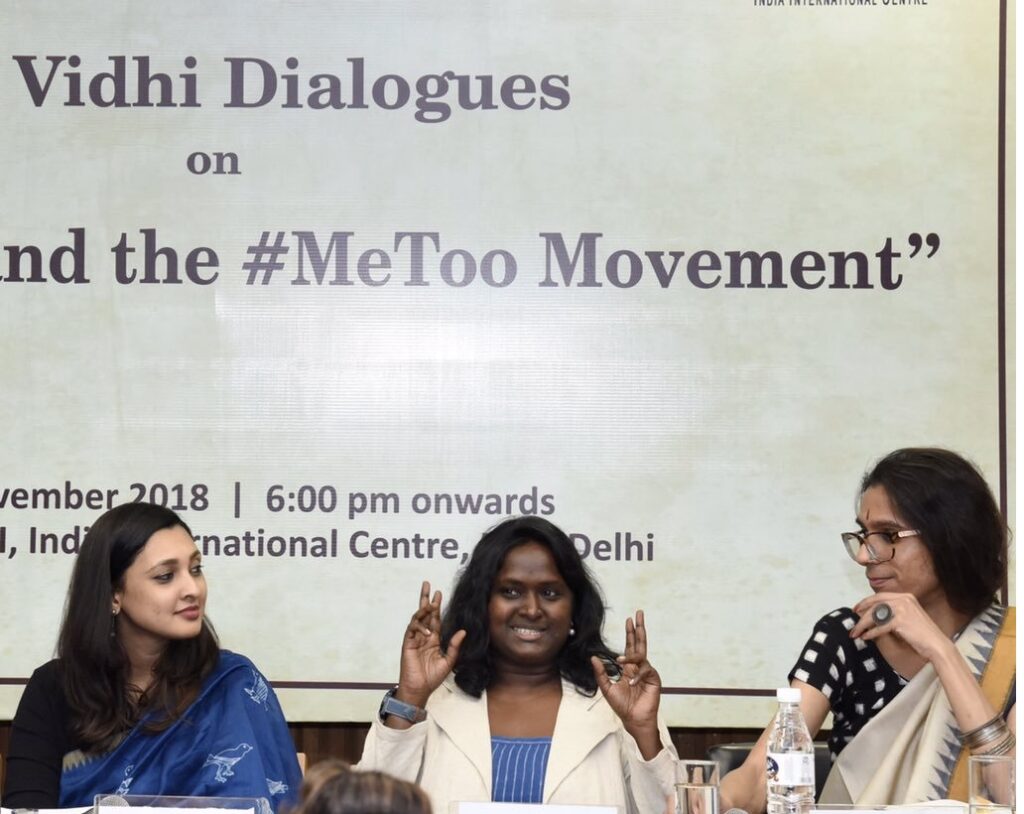
She worries about her safety, and for good reason. The Indian government has been intensifying its crackdown on activists and human rights groups. Meenakshi Ganguly, the South Asia director at Human Rights Watch, recently described the current situation as follows:
“The room for dissent in India is getting ever smaller, and anyone who critici[s]es government actions can become a target. […] Authorities seem more interested in silencing activists and journalists than in addressing the problems they bring to light.”
On Facebook, Kiruba has seen posts in which people offer prize money to cut off the tongue of prominent writers. She knows of people that were arrested just because they were carrying a book about tribal activist movements. Dozens of writers and activists are living under house arrest. The right to expression is being curtailed—fast.
In many ways, the society Kiruba lives in constitutes a hostile environment for her work. But she feels she has a responsibility to counter false narratives that attempt to pit groups against each other. With national elections just two months away, some Hindu groups are targeting people that speak out against discrimination, labelling them anti-nationalist or ‘Naxal,’ a popularised term to describe a member of the armed wing of the Communist Party of India. “Obviously, we are not militants,” says Kiruba. “We are just trying to make this government, and this country, more equal, and more secular.”
Kiruba finds encouragement in the words and life of Dr. Ambedkar, a Dalit man from Maharashtra state in west-central India. He was the drafting committee chairman of the Indian constitution and the first law minister of India from 1947 to 1951. Dr. Ambedkar inspired thousands of Dalits to study, to choose the profession they like, and to live a life with human dignity. One of Kiruba’s favourite Ambedkar quotes is: “Cultivation of mind should be the ultimate aim of human existence.”
“Like him, I too have a duty to serve my community and do my best to uplift their social position,” she says earnestly, adding: “Wherever I go, my message will always serve that purpose.”
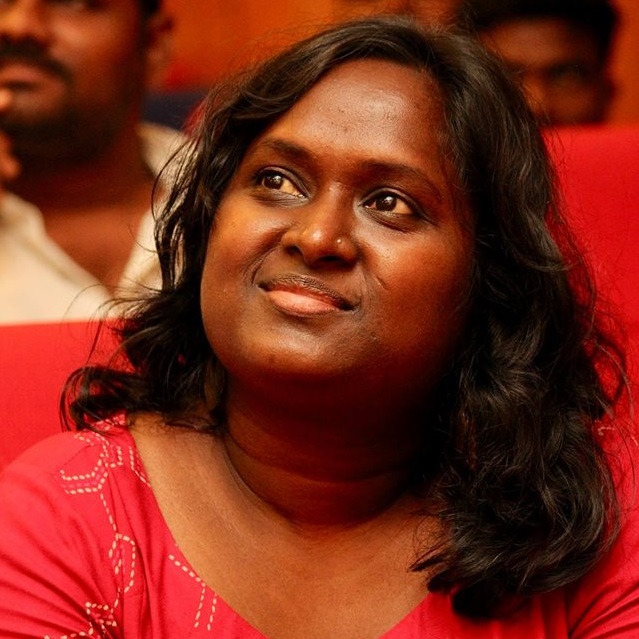
We thank Kiruba for sharing her story of perseverance and courage.
